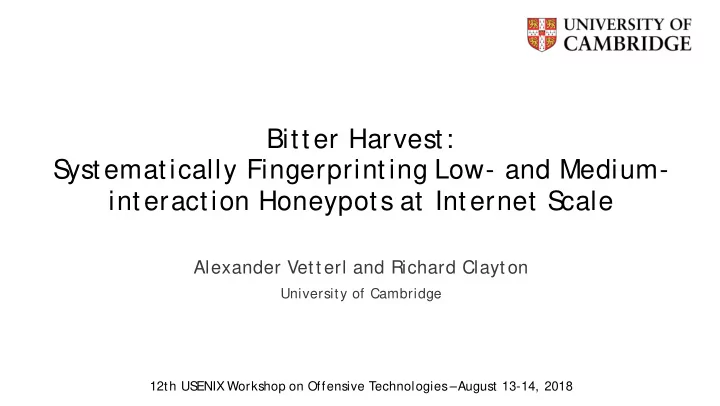

Bitter Harvest: S ystematically Fingerprinting Low- and Medium- interaction Honeypots at Internet S cale Alexander Vet t erl and Richard Clayt on University of Cambridge 12th USENIX Workshop on Offensive Technologies –August 13-14, 2018
Introduction Honeypots: A resource whose value is being attacked or compromised Cowrie – commands implemented — Honeypots have been focused for years on the monitoring of human activity — Adversaries attempt to distinguish honeypots by executing commands — Honeypots continuously fix commands to be “ more like bash” 2
How we currently build (S S H) honeypots 1. Find a library that implements the desired protocol (e.g. TwistedConch for SSH) 2. Write the Python program to be “ j ust like bash” 3. Fix identity strings, error messages etc. to be “ j ust like OpenSSH” RFCs OpenS S H Twist edConch sshd Cowrie bash Problem: There are lot of subtle differences between TwistedConch and OpenSSH! 3
Honeypots in this study 4
Methodology – Overview We send probes to 40 different implementations — 9 Honeypots — OpenSSH, TwistedConch — Busybox, Ubuntu/ FreeBSD telnetd — Apache, nginx We find probes that result in distinctive responses We find ‘ the’ probe that results in the most distinctive response across all implementations and perform Internet wide scans Triggered 158 million responses 5
Methodology – Cosine similarity — We represent our responses as a vector of features appropriate to the network protocol — The higher the cosine similarity coefficient, the more similar the two items under comparison x 2 Item 2 Item 1 Cosine distance x 1 6
Probe generation –Telnet and HTTP 25 440 Telnet negotiation sequences (RFC854) 4 option codes (WILL, WON’T, DO, DON’T) IAC WILL BINARY IAC WILL LOGOUT IAC escape character 40 Telnet options 47 600 HTTP requests (RFC2616 and RFC2518) 43 different request methods GET /. HTTP/0.0.\r\n\r\n 123 non-printable, non- 9 different HTTP versions alphanumeric characters (HTTP/0.0 to HTTP/2.2) 7
Probe generation – S S H 192 SSH version strings (RFC4253) — [S S H, ssh]-[0.0 – 3.2]-[OpenS S H, ""] S P [FreeBS D, ""][\r\n, ""] 58 752 KEX_INIT packets (RFC4250) — 16 key-exchange algorithms, 2 host key algorithms — 15 encryption algorithms, 5 MAC algorithms, — 3 compression algorithms Three variants of (malformed) packets Packet Padding Random Payload MAC Length Length Padding 1 byte variable 4 bytes 4-255 bytes 8
Results – S imilarity across implementations SSH n=157 925 376 Telnet n=356 160 HTTP n=571 212 9
Results – Reasons for distinctive responses — (Random) padding of SSH packets Packet Padding Random Payload MAC Length Length Padding 1 byte variable 4 bytes 4-255 bytes — Servers close the connection as a result of bad packets — Not supported or ignored HTTP methods — Not supported or ignored Telnet negotiation options — Different error messages returned — and more… 10
Results Telnet – Internet wide scans (1/ 3) — First study to give an estimate of Telnet implementations — Most implementations are similar to Busybox 1.6-2.4 — Not many servers respond in the same way as honeypots 11
Results S S H/ HTTP – Internet wide scans (2/ 3) Most implement at ions are similar Most implement at ions are similar t o nginx t o OpenS S H 6.6 and OpenS S H 7.2 1.12.1, Apache 2.2.34 and Apache 2.4.27 12
Results Honeypots – Internet wide scans (3/ 3) 13
Validation and Accuracy (1/ 2) Random padding of packets does not allow for exact matches Use second-best dist inguishing probe R emoving t he random part s 14
Validation and Accuracy (2/ 2) Equal Error Rate (ERR) of 0.0183 — We falsely accept and at the same time fail to identify 51 honeypots — 2,779 honeypots as ‘ ground truth’ 15
Results – Mass Deployment — 724 IPs run both an SSH and Web honeypot — Many honeypots are hosted at well-known cloud providers 16
Results (S S H) – Configuration — Only 79% of SSH honeypots have an unique host key — SSH Honeypot operators rarely update their honeypots 17
Impact and Countermeasures We can detect your honeypots without even trying to send any credentials — It is hard to tell from the logging that you've been detected! — It is easy to add scripts using these techniques into tools such as Metasploit! Closely monitor and update your honeypots — Honeypot operators are as bad as anyone with patching Patching against the specific distinguishers we report in the paper is not a solution as there are thousands more — We developed a modified version of the OpenS S H daemon (sshd) which can front-end a Cowrie instance so that the protocol layer distinguishers will no longer work 18
Ethical Considerations — We followed our institution’s ethical research policy — with appropriate authorisation at every stage — We used the exclusion list maintained by DNS-OARC — We notified all local CERTs of our scans — We respected requests to be excluded from further scanning — We notified the relevant honeypot and library developers of our findings 19
Conclusion Presented a generic approach for fingerprinting honeypots (“class break”) — With a TCP handshake and usually one further packet we identify if you are running Kippo, Cowrie, Glastopf or various other (we believe all) low- and medium-interaction honeypots Performed Internet wide scans for 9 different honeypots — Found 7,605 honeypots residing on 6,125 IPv4 addresses — Maj ority are hosted at well known cloud providers — Only 39% of S S H honeypots were updated within the previous 7 months We need a new architecture for low- and medium-interaction honeypots — The “ bad guys” can easily reproduce and implement our techniques 20
Q & A Alexander Vetterl alexander.vetterl@cl.cam.ac.uk https://github.com/amv42/sshd-honeypot 21
Recommend
More recommend